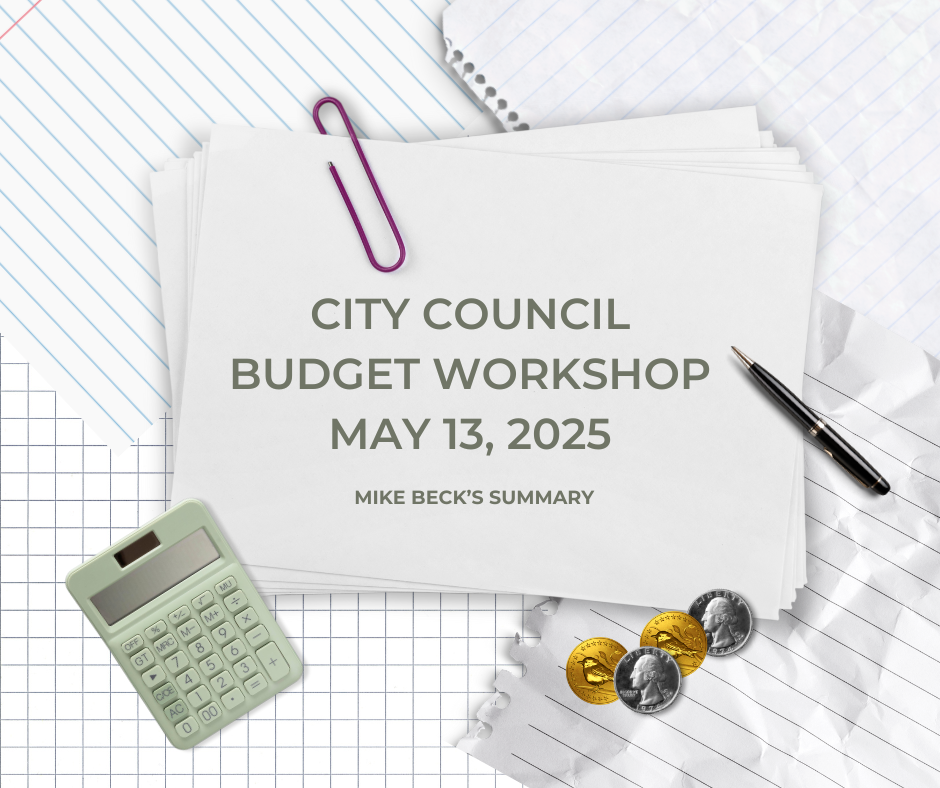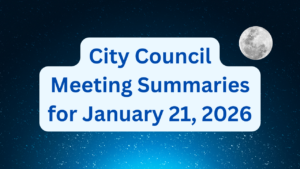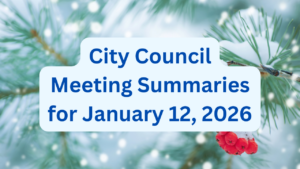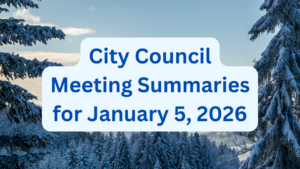
Disclaimer: The views I express here are my own as a citizen of Bangor and should NOT be construed as speaking for the City of Bangor or the City Council of Bangor.
City Council Budget Workshop Summary
The City Council held a budget workshop focusing on several key areas, including governance, public health, community connector services, stormwater management, and general revenues. Click here for the agenda.
Governance
The governance portion of the budget, encompassing City Council, the Records Department (formerly City Clerk), Elections, the Treasury front counter, Assessing, and Legal, saw revenues increase slightly by approximately $20,000. However, expenses rose by nearly $200,000. This increase is primarily attributed to wage adjustments (including cost of living and merit increases), higher health insurance costs, an additional election, and increased software expenses.
A new program request was made to hire an additional front-end staff member to alleviate delays in phone, in-person, and mail processing. The city is also in the process of implementing an online payment system. Current wait times for services are longer due to a statewide change in standard license plates. Key priorities for this section include leveraging technology for online payments, addressing staff turnover, and investing in training for new employees. The Federal Real ID implementation is also driving up demand for vital records. The Assessing department has experienced significant turnover, with some longtime employees having left. As a result, the department is currently in the process of retraining newer staff. Concurrently, they are dedicating considerable time to outreach efforts concerning the property revaluation, including managing FAQs and answering questions from the public to keep the revaluation project progressing. The Legal department is updating the vacant property ordinance and has had a first reading of a new nuisance property ordinance.
Council discussions included adding the new front-end position to the agenda for further consideration, a suggestion to review all new program requests together to understand their cumulative budget impact, and a request for a cost analysis of the proposed new position. Concerns were voiced about the workload in the Clerk’s office, particularly during elections, and the loss of a key volunteer. While online payment options exist, a significant number of residents still prefer in-person transactions. The city does hire temporary staff for elections. Questions arose about overtime in the Clerk and Treasury department and whether hiring more permanent staff would be more cost-effective, with requests for comparative data and mail volume trends. Hiring practices for new staff involve correcting past pay inequities for entry-level roles and considering market rates and experience. An explanation was requested for an increase in “miscellaneous” expenses within council services. The 19% increase in the governance budget was noted, with $36,000 attributed to an additional election.
Public Health and Community Services
A significant portion of public health activities is funded through grants rather than the municipal budget. The taxpayer-funded budget covers some administrative costs, general assistance, and aspects of the public health nursing program and immunization clinic. Grant funding, often federal, allows the city to expand its public health capacity. The Homeless Response Manager position is being moved under the public health department, with ARPA funds covering the cost. General assistance costs have remained relatively stable.
This department has no new program or capital requests, as they operate from rented space. Priorities include fostering community partnerships, continuing accreditation efforts, completing strategic planning, and enhancing coordination of homelessness response services. One federal grant is ending, with a $16,000 impact, but this was anticipated. City policy dictates that grant-funded programs are not shifted to the general fund without Council approval; loss of grant funding results in the elimination of the associated positions. Charges for services in this area include ARPA funds and indirect costs recovered from grants. There are concerns about potential federal funding cuts for Naloxone distribution; if these occur, the program would cease unless alternative funding is secured. The accreditation process is progressing slowly due to resource limitations, with an application anticipated in 2026. Opioid settlement funds are not yet budgeted and will be handled through a separate process. General assistance revenues are $1.177 million against expenses of $1.539 million, resulting in a local share of just under $400,000. The 100% federally funded WIC program was highlighted as a critical service whose loss would significantly impact vulnerable families. A request was made for information on the total grant funds secured by the city’s grant writer.
Community Connector
The Community Connector public transportation system serves Bangor and surrounding communities, including augmented services for the University of Maine. It provides both fixed-route and ADA paratransit services. Significant administrative restructuring has occurred to manage increased compliance requirements due to direct federal funding and growing service demands. Investments have been made in transit technology, fixed bus stops, and increasing the number of dispatchers to four. Recent funding has supported the training of additional drivers.
Priorities include ongoing technology improvements, boosting ridership, evaluating the implementation of fixed stops, rehabilitating the “cold bus barn,” strengthening the administrative structure, and addressing staffing challenges, particularly the CDL driver shortage. The goal is to reinstate Saturday service once operational stability is achieved. The fare structure and employment flexibility for drivers are also under review. The total operating revenue for the system is $4.7 million, with expenses at $6.4 million. Bangor’s share of the resulting $1.44 million shortfall is 61.52%. Cost increases are mainly due to personnel and software contracts. While state funding for public transit has increased, its long-term sustainability is uncertain. Delays in federal funding allocations create operational challenges. New program requests include an operations officer position and an estimate for transitioning to full-time driver status.
Capital items discussed include annual reserve funding, ADA van purchases (often 80% grant-funded), and the “cold bus barn” rehabilitation project (a $9.7 million project with significant federal and state grant contributions). Discussions also covered continued technology expansion and potential vehicle replacements pending grant applications. The use of reserves for the local match for a full-time driver program versus the annual replacement reserve was debated. Requests were made for ADA and overall ridership data by community. For the upcoming fiscal year, Bangor’s contribution to the annual replacement reserve will be 50%.
Stormwater Utility Fund
This fund was established to meet EPA requirements related to the city’s seven urban impaired streams. It generates approximately $1.6 million annually through fees assessed on property owners based on impervious surface area. Much of the fund’s operating costs are project-based, including monitoring, culvert work, and the creation of rain gardens and other infrastructure to improve water runoff. The fund supports a stormwater technician, half an engineering position, and part of a billing position. Stormwater projects are often coordinated with wastewater treatment and other engineering initiatives. While the city historically received federal Section 319 funds, projects now required by permit are less likely to qualify. Challenges include working with private property owners to reduce pavement and salt runoff. An increase in revenue for this fund was attributed to interest income, and a request for current balance details was made. The most challenging areas for stormwater management are heavily paved commercial areas.
Other/Miscellaneous and General Revenues
This category includes various smaller funding items. The Bangor Public Library’s budget will be discussed separately at the next meeting. It also covers debt service for city-wide capital investments and Tax Increment Financing (TIFs) and Credit Enhancement Agreements (CEAs). This is the final year of a 26-year pension debt payment of $3 million; the proposed budget includes using reserves to pay this off, as it’s a non-recurring expense. City organizational dues and $50,000 for tourism (previously supporting the Bangor Region Chamber of Commerce) are also included. A new program request aims to combine these tourism funds with other sources to hire a convention business-focused position. The county tax saw an increase of approximately $138,000. The status of discussions with the City of Brewer regarding the 4th of July Corporation is pending. A reduction in TIFs for 2026 is likely due to an existing TIF expiring.
General revenues, which are not tied to specific departments and help reduce the overall tax burden, include:
- Excise Tax: Remains relatively flat at around $7 million, with potential for future fluctuations.
- Revenue Sharing: Expected to increase substantially, though the complex formula means it could be affected by property revaluations statewide and locally.
- State Reimbursements: For programs like BETE and the Homestead exemption, these are decreasing. As property values rise and mill rates fall, the state reimbursement (tied to the mill rate) also declines, contributing to higher residential tax bills.
- All Other Revenues: This includes interest income and cable franchise fees, the latter of which are declining due to “cord-cutting”.
A discussion on the interest earned from opioid settlement funds will be scheduled. The anticipated capital investment from GE has not yet materialized; when it does, it will be subject to BETE, with the city receiving a portion back from the state. There was support for lobbying efforts to enable the city to charge franchise fees to streaming services.
Procedural Notes:
Questions raised during the workshop will be documented, with answers provided in subsequent budget updates. Requests for further information will also be noted for future public discussion, and items can be revisited if added to a list for future agendas. The city assessor is nearing finalization of property value numbers. Savings from a new private plan for paid family medical leave are being factored into the budget. It was reiterated that the City Manager’s proposed budget does not include new programs, as these are policy decisions for the Council.





